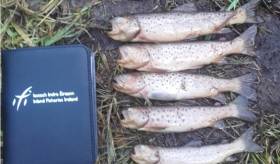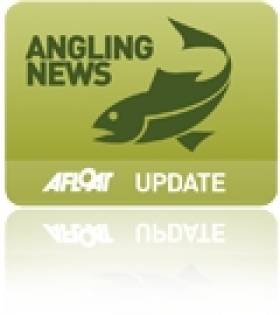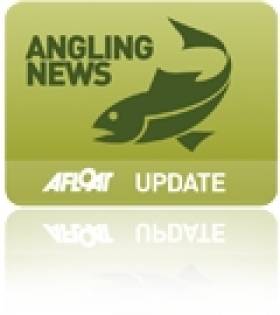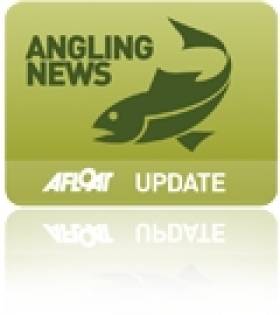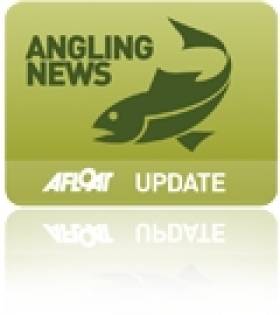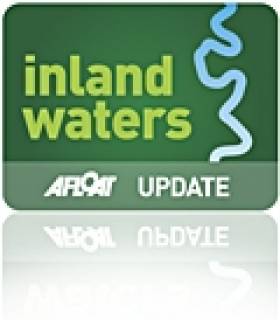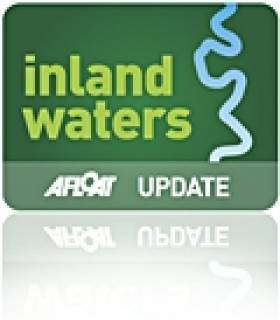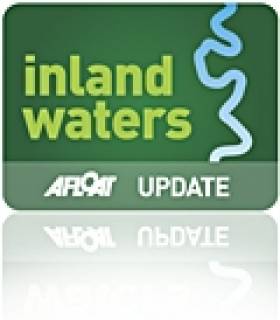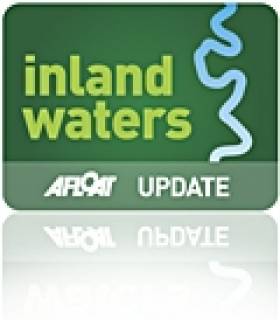Displaying items by tag: fish kill
Loughrea Firm Convicted Over Cavan Fish Kill
#FishKill - A Loughrea business was convicted over pollution discharge into the Laragh River in Co Cavan, causing a major fish kill between 12-14 August last year.
In addition to the fine of €4,000, Glan Agua was directed to pay legal costs and expenses to Inland Fisheries Ireland (IFI) to a total of €63,352.94 including €59,262.94 towards appropriate mitigation measures.
Glan Agua was prosecuted by IFI following investigations into a fish kill on the Laragh River after the discharge of chorine from Knockataggert drinking water treatment plant.
At a sitting of the District Court held at Cavan Courthouse on Thursday 23 June, Judge Denis McLoughlin heard evidence from Ailish Keane, senior fisheries environmental officer with IFI, that IFI carried out detailed investigations on the Laragh River over a number of days after a tip-off from the public.
It was established that more than 3,000 fish – including brown trout, minnow, stone loach, eel and stickleback – had been killed over a distance of 6km from a surface water outfall at the Clifferna Bridge to just below Drumgur Bridge.
Giving details of sampling and analysis undertaken, Keane confirmed the discharge from the surface water pipeline to the Laragh River was characterised by seriously elevated levels of sodium hypochlorite, otherwise known as chlorine.
Keane said that on the morning of 13 August, she visited the Knockataggert drinking water treatment plant at Clifferna, Co Cavan. She noted that there was a serious fish kill and that there had been a chorine on the premises that had subsequently discharged into a surface water pipe that later flows directly into the Laragh River.
On instruction, staff from Glan Agua immediately completed the clean-up of the discharge and prevented all remaining effluent residues from entering the watercourse. Glan Agua staff were found to be fully co-operative at all times during the investigation.
The legal representative for Glan Agua, who told Judge Mcloughlin their client pleaded guilty in the matter, noted his client’s pristine record prior to this incident. He said that a director of the company was present in court and the employee who presided over the plant on the date the incident took place had been severely reprimanded.
Extensive evidence was given by Keane regarding the extent of investigations undertaken as a result of this significant pollution incident. The court was told it would take years for the river to regenerate itself to the condition it was in previous to the incident. Judge McLoughlin stated he could not stress the seriousness of the situation enough prior to handing down the sentence.
IFI has a confidential hotline number to enable members of the general public to report incidents – 1890 34 74 24 or 1890 FISH 24. This phone line is designed to encourage the reporting of incidents of illegal fishing, water pollution and invasive species.
Major Fish Kill on Spawning Tributary of Clare River, Galway
Inland Fisheries Ireland is currently investigating a major fish kill on the Yellow River, a tributary of the Sinking River near Dunmore, Co. Galway, which flows into the Clare River. The stream in question is an important spawning and nursery habitat for young trout and salmon.
Staff were notified of the fish kill late last week and an immediate inspection revealed large numbers of dead fish in the river over almost one kilometre downstream. Dead crayfish were also found. Staff traced the source of the pollution to silage effluent leaking from a silage pit on a nearby farm. Samples and photographs were taken, and a prosecution will be taken in light of the severe nature of the pollution.
Inland Fisheries Ireland is again appealing to farmers to exercise vigilance when harvesting and making silage at this time of year. Water levels are low in many rivers, so any pollution has a much greater impact. It is vital to prevent any leakage from silage pits, and to ensure slurry is only spread in suitable conditions and well away from streams and drains.
Commenting on the incident, Dr Ciaran Byrne, CEO of Inland Fisheries Ireland said “Protection of fish stocks is vital to maintaining an extremely valuable natural resource for the benefit of local and tourist anglers alike.
“Recreational angling in Ireland is worth over €836 million to the economy and supports over 11,000 jobs. Salmon and trout, in particular, depend on good water quality to survive, and IFI is committed to protecting water quality in our rivers and lakes. Members of the public can assist fisheries staff by reporting all instances of illegal fishing or pollution to IFI’s confidential 24 Hour hotline number at 1890 347 424".
Fish Kill Investigated At Carrigadrohid Reservoir
#FishKill - Inland Fisheries Ireland (IFI) and Cork County Council are investigating fish mortalities at Carrigadrohid Reservoir in Co Cork following the discovery of small numbers of bream and rudd.
As of 14 June no cause has been identified, but water and fish samples were being collected for further analysis at the popular coarse angling spot.
IFI has a 24-hour confidential hotline number to enable members of the public to report incidents at 1890 34 74 24 or 1890 FISH 24.
This phone line is designed to encourage the reporting of incidents of illegal fishing, water pollution and invasive species. For more information visit www.fisheriesireland.ie.
Inland Fisheries Ireland Monitors River Loobagh Pollution
#angling – Inland Fisheries Ireland (IFI) is today continuing to monitor an incident of pollution on the River Loobagh in Limerick, which resulted in an extensive fish kill earlier this week.
On 4th August 2014, IFI received a report from local anglers in Kilmallock that the River Loobagh at Riversfield Bridge, near the Limerick County Council water treatment plant, was in a polluted condition and dead fish could be seen. The River Loobagh is an important fishery, primarily for brown trout, but also for salmon which seemed to be returning to the river in small numbers.
A discharge of effluent into the River Loobagh was located, and the source was traced to an over ground steel slurry tank on a nearby farm. Once IFI contacted the farm owner, works immediately proceeded to prevent further discharge and the flow of effluent was intercepted at a number of locations, effectively preventing further discharge.
A series of samples were taken which have been sent for analysis. Pending the results of the analysis a decision will be made by IFI concerning a prosecution and any other legal actions that may be warranted.
IFI staff carried out a visual inspection of the River Loobagh to determine the extent of the fish kill. Further to this, approximately 555 fish were observed to be dead, with an additional 95 fish found by the local angling club. The majority of the fish were brown trout, as well as a small number of juvenile salmon.
IFI is continuing to work with both the farmer and Limerick County Council to ensure that no further pollution can arise and that all appropriate remedial action is taken. IFI will continue to monitor the situation and ensure that any pollution risk is removed.
Inland Fisheries Ireland (IFI) has a confidential hotline number to enable members of the general public to report incidents - 1890 34 74 24 or 1890 FISH 24. This phone line is designed to encourage the reporting of incidents of illegal fishing, water pollution and invasive species.
#fishkill – Inland Fisheries Ireland and Dublin City Council are today (23.07.14) continuing to monitor the River Tolka following a significant pollution incident which occurred yesterday, Tuesday 22nd July.
A definite line of inquiry is being followed in relation to the source of the pollution incident which resulted in an extensive fish kill in the river.
Further samples have been taken and analysis is ongoing.
Dublin City Council has also removed a boom wall barrier which it erected across the River Tolka at Griffith Park yesterday to contain the pollutant as this is no longer required.
Inland Fisheries Ireland (IFI) has a confidential hotline number to enable members of the general public to report incidents - 1890 34 74 24 or 1890 FISH 24. This phone line is designed to encourage the reporting of incidents of illegal fishing, water pollution and invasive species.
Fish Kill on Dublin's River Tolka to be Investigated
#fishkill – Inland Fisheries Ireland and Dublin City Council are today (22.07.14) investigating an extensive fish kill on the River Tolka in Dublin City.
The latest indications are that the fish kill extends from an area in the vicinity of Finglas Road Bridge for a considerable distance downstream. The full extent of the kill has yet to be quantified.
Inland Fisheries Ireland and Dublin City Council are continuing their emergency response and associated investigations in an effort to establish the source of any contaminating material that may have caused this major pollution event.
Inland Fisheries Ireland (IFI) has a freefone number to enable members of the general public to report incidents - 1890 34 74 24 or 1890 FISH 24. This phone line is designed to encourage the reporting of incidents of illegal fishing, water pollution and invasive species.
Fisheries Officers Investigate Cavan Fish Kill
#FishKill - Inland Fisheries Ireland (IFI) received reports of a fish kill on the River Lear in Baileborough, Co Cavan last Friday 23 May.
IFI staff responded immediately to the report and their investigations revealed approximately 35 dead brown trout and roach on this tributary of Castle Lake.
The kill extended over 2km, from just upstream of Lear Bridge (on the Baileborough to Shercock Road) as far as Castle Lake.
Water samples were taken from a number of locations along the affected stretch and IFI are awaiting results. Subsequent reports of dead fish in Castle Lake have been received by IFI.
Cavan County Council, who was informed of the fish kill by IFI, has launched its own separate investigation. IFI has also informed the Environmental Protection Agency (EPA).
During the course of their investigations, IFI staff also found a number of dead trout in a field adjoining the River Lear and a separate investigation has commenced to establish to how these fish came to be at this location.
IFI is particularly concerned about these incidents on the River Lear as there have been a number of fish kills here in the past, especially during low flow and high temperature events.
Farmer Pleads Guilty To Pollution Causing Carlow Fish Kill
#FishKill - A Carlow farmer has pleaded guilty to the accidental discharge of 'deleterious matter' into the River Burren at Cloontoose on 10 June last year, resulting in a fish kill that cost as many as 5,000 brown trout.
At a sitting of the District Court at Carlow Court House on Thursday 2 January, Judge O’Brien awarded costs of €2,135 to Inland Fisheries Ireland (IFI) and ordered that the farmer pay a contribution for habitat works.
The incident related to the release of fungicide to the river during the filling a a crop sprayer.
Donnachadh Byrne, senior fisheries environmental officer with IFI, told Judge O’Brien that following receipt of a fish kill report from Carlow County Council on Monday 10 June, IFI carried out investigations on the River Burren and had established that the fish kill extended over 4.2km with an estimate of 4,000-5,000 dead brown trout.
Giving details of sampling and analysis undertaken, Byrne confirmed that samples of dead fish taken from the Burren River when sent for analysis were found to have elevated concentrations of Pyraclostrobin, one of the main active ingredients of the fungicide Lumen, used to treat barley or oats, which was being used by the defendant.
The court was informed that the spillage of fungicides to the Burren River was accidental and related to a non-return valve which upon later inspection was found to be faulty,
These facts were acknowledged by IFI, who also confirmed that the defendant was fully co-operative at all times during the investigation.
The Burren River fish kill which extended over 4.2 kilometres, related to a relatively small discharge of pesticide to the Burren River.
IFI said the incident highlights the extreme toxicity of certain pesticides to the aquatic environment, as what was a relatively small discharge of pesticide extended to a stretch of more than 4.2km of the watercourse.
Construction Firm Convicted Over River Dodder Fish Kill
#FishKill - Inland Fisheries Ireland has secured a successful prosecution of a Galway-based construction company over a fish kill on the River Dodder in South Dublin earlier this year.
Ward and Burke Construction Ltd of Stradbally East, Kilcolgan, Co Galway was convicted and fined €2,000 by Judge William Hamill at a sitting of the District Court at the Four Courts on Monday 14 October.
The judge found in favour of Inland Fisheries Ireland (IFI) who took the prosecution following its investigation into the fish kill, which saw some 500 freshwater fish - including juvenile brown trout, lamprey and stoneloach - deceased over a 2km stretch of the River Dodder in the Tallaght area from below an outfall from Boherboy Water Supply Pipeline to a point upstream of Firhouse Weir.
Giving details of the sampling and analysis undertaken, IFI fisheries environmental officer Brian Beckett confirmed the discharge from the water supply pipeline to the Dodder was characterised by seriously elevated levels of chlorine.
Beckett said that on the afternoon of 1 March 2013, he instructed staff from Ward and Burke Construction Ltd to immediately terminate the discharge, and prevent all remaining effluent residues from entering the watercourse. Ward and Burke staff were found to be fully co-operative at all times during the investigation.
Legal representatives for Ward and Burke who had earlier told Judge Hamill there was a plea in the matter said that the discharge occurred as a result of human error, and as soon as this had come to their attention they had taken steps to prevent any further discharge.
It was also submitted that the construction firm had committed to provision of a sum of money to cover restocking or other appropriate costs to mitigate against damage caused as a result of the discharge.
Judge Hamill convicted Ward and Burke Construction Ltd and imposed a fine of €2000 and awarded legal costs and expenses to Inland Fisheries Ireland.
IFI Investigates Fish Kills In Longford Town, Lough Keeldra
#FishKill - Staff with Inland Fisheries Ireland (IFI) are investigating two separate fish kill incidents on Lough Keeldra in Co Leitrim and in the Camlin River in Longford town.
Considerable numbers of dead perch were recorded at Lough Keeldra, outside Mohill, following a report to IFI on 10 September. Live fish also observed in the lake were noted to be in distress.
The presence of blue/green algae is currently being considered as part of the investigations. Lough Keeldra is a designated bathing area and signs erected by Leitrim County Council prohibit bathing at present.
Elsewhere, more than 2,000 fish mortalities were recorded over a 6km stretch of the Camlin River from Cartron Bridge downstream as far as the confluence with the River Shannon after IFI staff began their investigation on 4 September following a tip-off from the public.
Brown trout, roach, pike, eel and white-clawed crayfish were among the dead fish discovered, although live fish have since been recorded within the affected area.
Water samples have been taken for analysis and IFI continuing with its investigation to try to identify the source of the pollution that caused the fish kill. This may not be possible given the fact that the fish kill is believed to have occurred on the weekend of the 1 September.
Members of the public are being urged to note that after a prolonged period of low flow levels and unseasonably high water temperatures, all aquatic life - but especially fish - are extremely vulnerable to the slightest deterioration in water quality.
Landowners and the owners of any premises or property that adjoins a watercourse should take particular care to ensure that every reasonable measure is taken to minimise any threat to water quality and fish life.
IFI is appealing to the public to report any incident or suspected incident of pollution or deterioration of water quality and sightings of distressed fish.
Amanda Mooney, director for the Shannon River Basin District, said: “Whether an incident occurs deliberately or inadvertently, it is critical for fish welfare and general water quality that incidents can be dealt with promptly.”
Inland Fisheries Ireland operates a confidential 24 hour hotline and suspected illegal fishing or pollution can be reported to 1890 347 424.




























